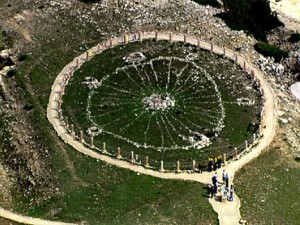Native American Med. (North-South)

www.native-americans-online.com
http://rainforests.mongabay.com/medicine
The indigenous peoples of the Americas are the pre-Columbian inhabitants of North, Central, and South America, their descendants, and many ethnic groups who identify with those peoples. They are often also referred to as Native Americans, Aboriginals, First Nations and by Christopher Columbus‘ geographical and historical mistake, Indians, now disambiguated as the American Indian race, American Indians, Amerindians, Amerinds, or Red Indians. According to the New World migration model, a migration of humans from Eurasia to the Americas took place via Beringia, a land bridge which connected the two continents across what is now the Bering Strait. The most recent point at which this migration could have taken place is c. 12,000 years ago, with the earliest period remaining a matter of some unresolved contention. These early Paleo-Indians soon spread throughout the Americas, diversifying into many hundreds of culturally distinct nations and tribes. According to the oral histories of many of the indigenous peoples of the Americas, they have been living there since their genesis, described by a wide range of traditional creation accounts. SEE NATIVE AMERICANS may be refering to: > HERE <
Traditional medicine (also known as indigenous or folk medicine) comprises medical knowledge systems that developed over generations within various societies before the era of modern medicine. Practices known as traditional medicines include herbal, Ayurveda, Siddha medicine, Unani, ancient Iranian medicine, Islamic medicine, traditional Chinese medicine, acupuncture, Muti, Ifá, traditional African medicine, and other medical knowledge and practices all over the globe. The World Health Organization (WHO) defines traditional medicine as: „the health practices, approaches, knowledge and beliefs incorporating plant, animal and mineral-based medicines, spiritual therapies, manual techniques and exercises, applied singularly or in combination to treat, diagnose and prevent illnesses or maintain well-being.“ Read More: > HERE <
The healing traditions of Native Americans have been practiced in North America since at least 12,000 years ago and possibly as early as 40,000 years ago. Although the term Native American medicine implies that there is a standard system of healing, there are approximately 500 nations of indigenous people in North America, each representing a diverse wealth of healing knowledge, rituals, and ceremonies.
Many aspects of Native American healing have been kept secret and are not written down. The traditions are passed down by word of mouth from elders, from the spirits in vision quests, and through initiation. It is believed that sharing healing knowledge too readily or casually will weaken the spiritual power of the medicine.
Native American medicine is based upon a spiritual view of life. A healthy person is someone who has a sense of purpose and follows the guidance of the Great Spirit. This guidance is written upon the heart of every person. To be healthy, a person must be committed to a path of beauty, harmony, and balance. Gratitude, respect, and generosity are also considered to be essential for a healthy life. Ken Cohen writes, „Health means restoring the body, mind, and spirit to balance and wholeness: the balance of life energy in the body; the balance of ethical, reasonable, and just behavior; balanced relations within family and community; and harmonious relationships with nature.“ Read More: > HERE <
The meaning of the term medicine to an American Indian is quite different from that which is ordinarily held by modern societies. To most American Indians, medicine signifies an array of ideas and concepts rather than remedies and treatment alone. There is no separation between religion and medicine in tribal culture and healing ceremonies are an integral part of the community experience. To the American Indian, the natural or correct state of all things, including man, is harmony. Far from being dominant over nature, man is seen as interdependent with other living beings and physical forces. All thinking is grounded in relationships. More emphasis is given to the connectedness of one thing to another than to the individual thing itself. To maintain a correct or natural relationship is to be in harmony. The universe is a complex matrix of interdependence. There is a proper set of relationships for each being, a proper existing in harmony with the universe. Read More: > HERE <
- Articles on Traditional & Native Medicine <
- WHO – Traditional Medicine <
- Commercialization of traditional medicines/BioPiraterie <
- DEVELOPMENT & THE HEALTH OF TRIBAL PEOPLE <
- UMN Native American Medicine Gardens, friends, fans at fb <
- Meet Survival International, friends, fans, at fb <
- Meet Indigenous Peoples Issues and Resources, friends at fb <
- Meet The International Ecotourism Society (TIES) at fb <
Comments are closed.